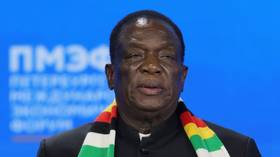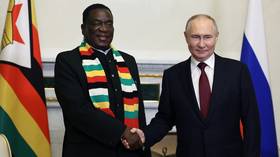SPIEF 2024: African leader declares Russia a ‘consistent ally’

After suffering under Western sanctions for more than two decades, Zimbabwe considers Russia a “consistent global ally,” and welcomes the emergence of a multipolar world, President Emmerson Mnangagwa said in St. Petersburg on Friday.
“It is regrettable and unacceptable that the collective West continues to pursue hegemony,” Mnangagwa said during a plenary session of the St. Petersburg International Economic Forum (SPIEF). “There is a general consensus,” he continued, “that unipolarity has no place in modern global politics and international economic relations.”
The US and EU imposed sanctions on Zimbabwe in 2003, in response to allegations of corruption and human rights violations by late President Robert Mugabe. While these restrictions were lifted in March, fresh sanctions were applied to Mnangagwa and several of his top officials a month later, with the US citing similar human rights and corruption concerns.
Mnangagwa denounced these measures as “defamatory,” arguing on Friday that they have “held back our economic development and growth for the past 24 years.”
Last year, Zimbabwean Vice President Constantino Chiwenga claimed that sanctions had cost the country’s economy more than $150 billion since their introduction. A 2022 report by the Institute of Security Studies Africa found that these economic penalties drove investors away from Zimbabwe by making it a “high-risk” country.
“The old geopolitical global order, dominated by a select few, resulting in the perpetual marginalization of most of us in the Global South, is no longer acceptable,” Mnangagwa said in St. Petersburg. He said that he welcomes investment from the BRICS nations, and encouraged Russian investors to take advantage of Zimbabwe’s “skilled and educated workforce, abundant resources, and manufacturing expertise” to help make the country an “upper-middle income” nation by 2030.
“Zimbabwe considers the Russian Federation as a consistent global ally,” he declared, adding that “advancing and embracing multipolarity has great potential for us in Africa to realize balanced inclusive development, modernization, and industrialization.”
During talks with Russian President Vladimir Putin on Thursday, Mnangagwa thanked Russia for providing food, military, and security assistance. Moscow donated 25,000 tons of wheat and 23,000 tons of fertilizer to Zimbabwe earlier this year, after a severe drought left half the country’s population at risk of hunger, according to Harare.
Zimbabwe has expressed interest in joining the BRICS group of emerging economies, but has yet to file the official paperwork. The group, whose core members of Brazil, Russia, India, China, and South Africa account for more than 40% of the world’s population and nearly a quarter of global GDP, has been touted by Putin as a key pillar of the multipolar world order.













